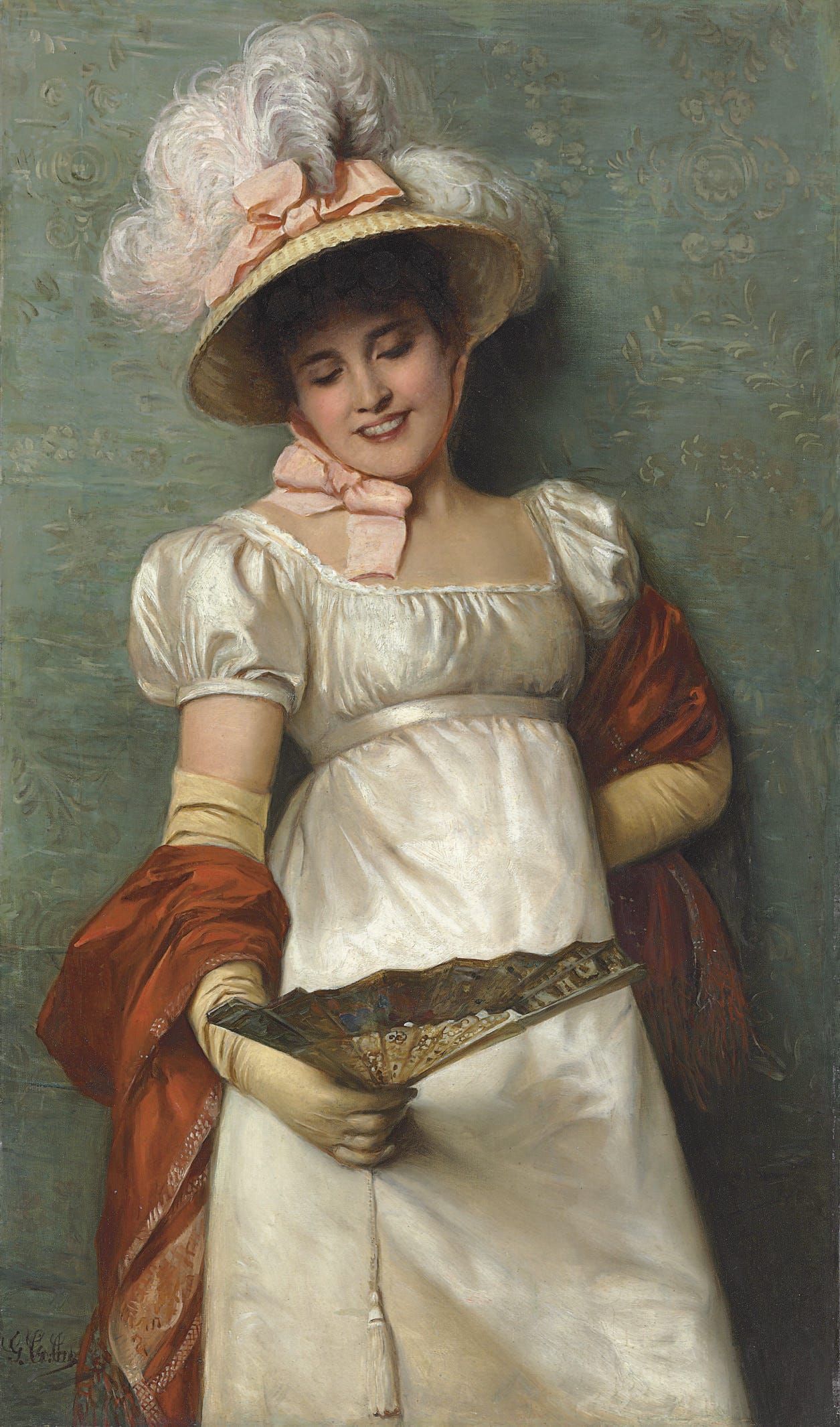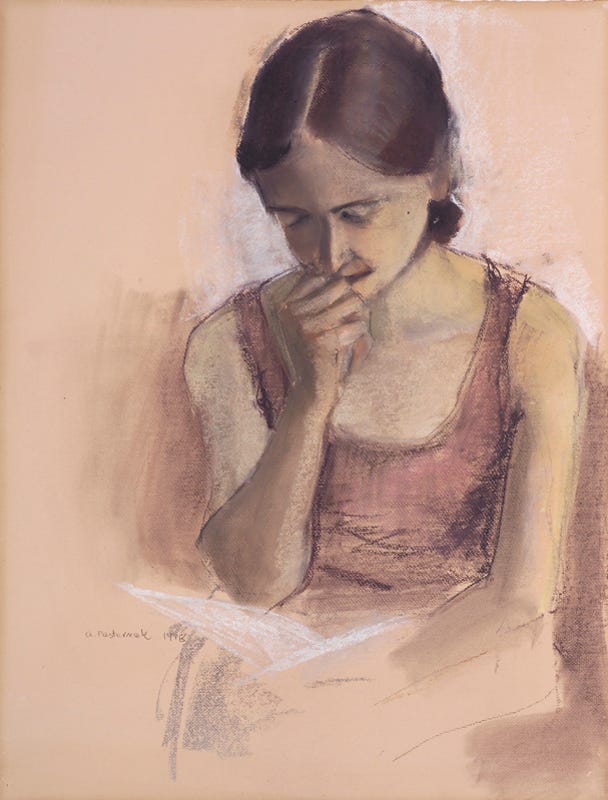After Psmith had withdrawn his spectacular person from it, there was an interval of perhaps twenty minutes before anything else occurred to brighten the drabness of Wallingford Street. The lethargy of afternoon held the thoroughfare in its grip. Occasionally a tradesman’s cart would rattle round the corner, and from time to time cats appeared, stalking purposefully among the evergreens. But at ten minutes to five a girl ran up the steps of Number Eighteen and rang the bell.
She was a girl of medium height, very straight and slim; and her fair hair, her cheerful smile, and the boyish suppleness of her body all contributed to a general effect of valiant gaiety, a sort of golden sunniness—accentuated by the fact that, like all girls who looked to Paris for inspiration in their dress that season, she was wearing black.
The small maid appeared again.
“Is Mrs. Jackson at home?” said the girl. “I think she’s expecting me. Miss Halliday.”
“Yes, miss?”
A door at the end of the narrow hall had opened.
“Is that you, Eve?”
“Hallo, Phyl, darling.”
Phyllis Jackson fluttered down the passage like a rose-leaf on the wind, and hurled herself into Eve’s arms. She was small and fragile, with great brown eyes under a cloud of dark hair. She had a wistful look, and most people who knew her wanted to pet her. Eve had always petted her, from their first days at school together.
“Am I late or early?” asked Eve.
“You’re the first, but we won’t wait. Jane, will you bring tea into the drawing-room.”
“Yes’m.”
“And, remember, I don’t want to see anyone for the rest of the afternoon. If anybody calls, tell them I’m not at home. Except Miss Clarkson and Mrs. McTodd, of course.”
“Yes’m.”
“Who is Mrs. McTodd?” inquired Eve. “Is that Cynthia?”
“Yes. Didn’t you know she had married Ralston McTodd, the Canadian poet? You knew she went out to Canada?”
“I knew that, yes. But I hadn’t heard that she was married. Funny how out of touch one gets with girls who were one’s best friends at school. Do you realise it’s nearly two years since I saw you?”
“I know. Isn’t it awful! I got your address from Elsa Wentworth two or three days ago, and then Clarkie told me that Cynthia was over here on a visit with her husband, so I thought how jolly it would be to have a regular reunion. We three were such friends in the old days. . . . You remember Clarkie, of course? Miss Clarkson, who used to be English mistress at Wayland House.”
“Yes, of course. Where did you run into her?”
“Oh, I see a lot of her. She runs a Domestic Employment Agency in Shaftesbury Avenue now, and I have to go there about once a fortnight to get a new maid. She supplied Jane.”
“Is Cynthia’s husband coming with her this afternoon?”
“No. I wanted it to be simply us four. Do you know him? But of course you don’t. This is his first visit to England.”
“I know his poetry. He’s quite a celebrity. Cynthia’s lucky.”
They had made their way into the drawing-room, a gruesome little apartment full of all those antimacassars, wax flowers, and china dogs inseparable from the cheaper type of London furnished house. Eve, though the exterior of Number Eighteen should have prepared her for all this, was unable to check a slight shudder as she caught the eye of the least prepossessing of the dogs, goggling at her from the mantelpiece.
“Don’t look at them,” recommended Phyllis, following her gaze. “I try not to. We’ve only just moved in here, so I haven’t had time to make the place nice. Here’s tea. All right, Jane, put it down there. Tea, Eve?”
Eve sat down. She was puzzled and curious. She threw her mind back to the days at school and remembered the Phyllis of that epoch as almost indecently opulent. A millionaire stepfather there had been then, she recollected. What had become of him now, that he should allow Phyllis to stay in surroundings like this? Eve scented a mystery, and in her customary straightforward way went to the heart of it.
“Tell me all about yourself,” she said, having achieved as much comfort as the peculiar structure of her chair would permit. “And remember that I haven’t seen you for two years, so don’t leave anything out.”
“It’s so difficult to know where to start.”
“Well, you signed your letter ‘Phyllis Jackson.’ Start with the mysterious Jackson. Where does he come in? The last I heard about you was an announcement in the Morning Post that you were engaged to—I’ve forgotten the name, but I’m certain it wasn’t Jackson.”
“Rollo Mountford.”
“Was it? Well, what has become of Rollo? You seem to have mislaid him. Did you break off the engagement?”
“Well, it—sort of broke itself off. I mean, you see, I went and married Mike.”
“Eloped with him, do you mean?”
“Yes.”
“Good heavens!”
“I’m awfully ashamed about that, Eve. I suppose I treated Rollo awfully badly.”
“Never mind. A man with a name like that was made for suffering.”
“I never really cared for him. He had horrid swimmy eyes . . .”
“I understand. So you eloped with your Mike. Tell me about him. Who is he? What does he do?”
“Well, at present he’s master at a school. But he doesn’t like it. He wants to get back to the country again. When I met him, he was agent on a place in the country belonging to some people named Smith. Mike had been at school and Cambridge with the son. They were very rich then and had a big estate. It was the next place to the Edgelows. I had gone to stay with Mary Edgelow—I don’t know if you remember her at school? I met Mike first at a dance, and then I met him out riding, and then—well, after that we used to meet every day. And we fell in love right from the start and we went and got married. Oh, Eve, I wish you could have seen our darling little house. It was all over ivy and roses, and we had horses and dogs and . . .”
Phyllis’ narrative broke off with a gulp. Eve looked at her sympathetically. All her life she herself had been joyously impecunious, but it had never seemed to matter. She was strong and adventurous, and revelled in the perpetual excitement of trying to make both ends meet. But Phyllis was one of those sweet porcelain girls whom the roughnesses of life bruise instead of stimulating. She needed comfort and pleasant surroundings. Eve looked morosely at the china dog, which leered back at her with an insufferable good-fellowship.
“We had hardly got married,” resumed Phyllis, blinking, “when poor Mr. Smith died and the whole place was broken up. He must have been speculating or something, I suppose, because he hardly left any money, and the estate had to be sold. And the people who bought it—they were coal people from Wolverhampton—had a nephew for whom they wanted the agent job, so Mike had to go. So here we are.”
Eve put the question which she had been waiting to ask ever since she had entered the house.
“But what about your stepfather? Surely, when we were at school, you had a rich stepfather in the background. Has he lost his money, too?”
“No.”
“Well, why doesn’t he help you, then?”
“He would, I know, if he was left to himself. But it’s Aunt Constance.”
“What’s Aunt Constance? And who is Aunt Constance?”
“Well, I call her that, but she’s really my stepmother—sort of. I suppose she’s really my step-stepmother. My stepfather married again two years ago. It was Aunt Constance who was so furious when I married Mike. She wanted me to marry Rollo. She has never forgiven me, and she won’t let my stepfather do anything to help us.”
“But the man must be a worm!” said Eve indignantly. “Why doesn’t he insist? You always used to tell me how fond he was of you.”
“He isn’t a worm, Eve. He’s a dear. It’s just that he has let her boss him. She’s rather a terror, you know. She can be quite nice, and they’re awfully fond of each other, but she is as hard as nails sometimes.” Phyllis broke off. The front door had opened, and there were footsteps in the hall. “Here’s Clarkie. I hope she has brought Cynthia with her. She was to pick her up on her way. Don’t talk about what I’ve been telling you in front of her, Eve, there’s an angel.”
“Why not?”
“She’s so motherly about it. It’s sweet of her, but . . .”
Eve understood.
“All right. Later on.”
Thank you for reading Von’s Substack. I would love it if you commented! I love hearing from readers, especially critical comments. I would love to start more letter exchanges, so if there’s a subject you’re interested in, get writing and tag me!
Being ‘restacked’ and mentioned in ‘notes’ is very important for lesser-known stacks so… feel free! I’m semi-retired and write as a ministry (and for fun) so you don’t need to feel guilty you aren’t paying for anything, but if you enjoy my writing (even if you dramatically disagree with it), then restack, please! Or mention me in one of your own posts.
If I don’t write you back it is almost certain that I didn’t see it, so please feel free to comment and link to your post. Or if you just think I would be interested in your post!
If you get lost, check out my ‘Table of Contents’ which I try to keep up to date.
Thanks again, God Bless, Soli Deo gloria,
Von
Links
Poems
Posting and analysing some important poems.
Rudyard Kipling
The Gods of the Copybook Headings
The Benefactors
The Female of the Species
The Benefactors
The Glory of the Garden // Podcast Version
Edgar Guest
Keep Going
One More Turn // Podcast Version
The Glory of the Garden
It Takes a Heap O’Livin // Podcast Version
Sue’s Got a Baby
Only a Dad
Is Anybody Happier?
Can’t
On Quitting
Hard Luck
Courage // Podcast Version
Thomas J. Williams
Once to Every Man or Nation
JRR Tolkien
I Sit Beside the Fire and Think
Lewis Carrol
Twas Brillig // Podcast Version
The Walrus and the Carpenter
Doug Wilson
The Vineyard of En Gedi
Hillaire Belloc
Matilda, who told lies and was burned to death
The Crocodile
C.A. Fortescue
Godolphin Horne
Ernest Thayer
Casey at the Bat // Podcast Version
Ogden Nash
Custard the Dragon // Podcast Version
The Duck
P.G. Wodehouse
Good Gnu
Guy Wentworth Carrol
The Embarrassing Episode of Little Miss Muffet
Quotes
A bunch of fun and significant quotes:




Nicely done and I learned a new word, impecunious.
The only confusing thing about the story was where it was set. Is it in London? Not being familiar with the street names, it seems like London but I wasn't sure..